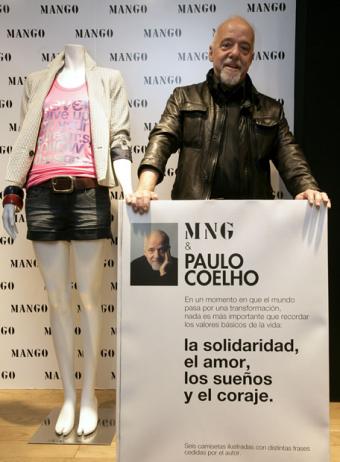
MNG launch with Paulo Coelho
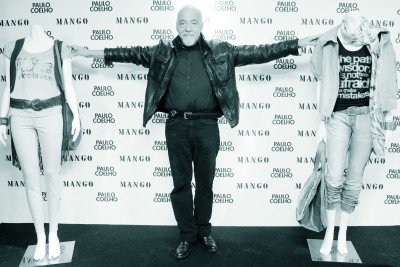
Paulo Coelho una vez más pone su empeño en una acción altruista
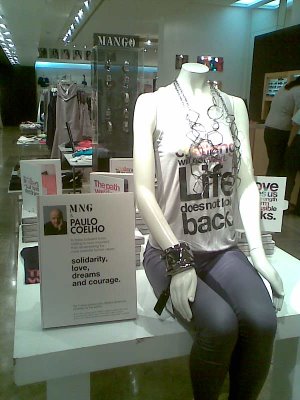
Mango store in Qatar
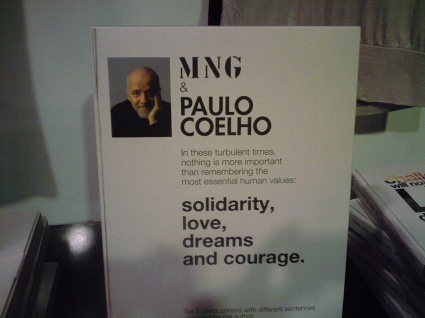
MNG & Paulo Coelho
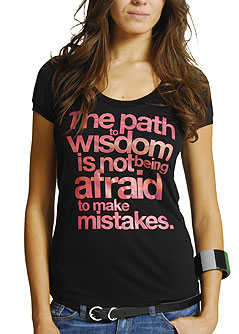
the medium is the message
'I knew it was impossible to change my country, Brazil. It was impossible to change my state and my neighbourhood, but I thought I might change my street at the end of which there is a favela.' -- Paulo Coelho
'I am very proud of the project, not only because the money goes to Paulo Coelho's Institute, but also because we we need more platforms to discuss important issues. A t-shirt is one of many ...' -- Paulo Coelho
'... you don't need to wear Mango, and no readers of mine need ... we need to use every single platform to pass the message. And although Paulo Coelho Institute will get the money from the sales of the T-shirts, this was not my only concern when I accepted the idea. As McLuhan once said, the medium is the message. I am glad that Mango accepted the idea.' -- Paulo Coelho
'In the case of pirate copies, the message will prevail.' -- Paulo Coelho
Once the initial euphoria had died down, where can I get my t-shirt been asked, concerns started to be raised, if nothing else Paulo Coelho readers are a discerning lot. Are the t-shirts made from organic cotton? Are they fair trade? Is nothing sacred? Is Paulo Coelho now a brand? How long before pirate copies hit the streets? Will wearing a Paulo Coelho t-shirt make me wise?
 http://paulocoelhoblog.com/2009/04/22/mango-store-in-qatar/
http://paulocoelhoblog.com/2009/04/22/mango-store-in-qatar/  http://paulocoelhoblog.com/2009/04/20/solidarity-t-shirts/
http://paulocoelhoblog.com/2009/04/20/solidarity-t-shirts/ The t-shirts are made in Turkey, a country with a non-existent human rights record. Spanish fashion chain Prada has recently been criticised for worker exploitation in Turkey. Mark Thomas in his excellent book Belching Out the Devil exposed the treatment of workers at Coca-Cola bottling plants in Turkey.
 http://www.labourbehindthelabel.org/campaigns/urgent/desa/271-pradaection
http://www.labourbehindthelabel.org/campaigns/urgent/desa/271-pradaection  http://www.labourbehindthelabel.org/campaigns/urgent/desa/campaigns/urgent/desa
http://www.labourbehindthelabel.org/campaigns/urgent/desa/campaigns/urgent/desa Industrial cotton is one of the most environmentally damaging crops that Man grows. Organic cotton is much pleasanter to wear. Organic cotton is biodegradable and can easily be recycled.
Industrial cotton requires an enormous amount of pesticide to keep it viable. Each pound of product requires a third of a pound of pesticides, which adds up to 25 percent of all pesticides used in the US for 13 million acres of cotton. Many cotton pesticides are EPA toxicity class I, like the viciously effective insecticides Methomyl and Methyl Parathion. A study by the California Department of Pesticide Regulation revealed that pesticide usage per acre increased during the 1991 to 1995 period by 4.21 pounds to 14.15 pounds per acre. The reality in the Third World, where pesticide regulation is more relaxed, is much worse.
Commercial white cotton is by far the most pesticide-dependent crop in the world and a major global crop. Fifty-five countries rely upon cotton for a significant percent of GDP. Cotton processing also takes another toxic toll, as the use of chlorine bleaching agents, formaldehydes and phenols is quite dangerous to all life. Fabric dyes utilizing arsenic, lead, cadmium, cobalt, zinc, and chromium are also very problematic. All processing stages produce large amounts of toxic wastewater. Azo dyes are cheap and common, about 2,000 exist. Many are water based and possess highly carcinogenic material absorbed by the skin and accumulated in the body. Inhalation, aquatic exposure or simple skin contact can be harmful. The EU has banned import and usage of the more toxic versions containing arylamines, though these products are used elsewhere. Other acid dyes produce waste streams with pH values above 11 and with possible carcinogen content.
Organic cotton is good for the planet, good for ourselves.
Natural cotton does not have to be any colour so long as it is off-white. Cotton grows in varying hues from purple to brown. Cross-breeding programmes have selected cotton of red, blue, green. This eliminates the need for dyes. Maybe something Mango should actively pursue.
Paulo Coelho has responded to the concerns raised:
' ... as far as I know, it is organic. I cannot swear to you, but MNG is very concerned about the quality of their products. That's why we decided to join forces. You can imagine how many propositions during all these years we had (as for T-shirts), and we never endorsed any of them. Today these companies are accountable for everything, and they are very concerned. You remember what Nike faced (better saying, deserved) a few years ago, when a TV program tracked down the assembly line of their products to child labor. As far I could see, the T-shirts are made in Turkey, where there is no child labor ... '
'During all these years I saw so many times dreams being manipulated, charity dinners where the bulk go to the organizers of the event, NGOs that are not accountable and play with the sense of guilty that the rich has towards the poor. Some times I also get caught into traps (this year, for example, I supported one of these malefic charity dinners, just to realize at the end that it was about everything that I hate). Therefore, to raise the red flag is very important. At the same time, to be too defensive may keep you away from risks, but also away from life and its challenges. As one of the T-shirts say, to live is not to be afraid of making mistakes. In the case of MNG my team did a deep review on their objectives, and they are reliable partners.'
'I receive 30% of the sales (the rest going to retailers, distribution, manufacturing, etc), and it goes to Instituto Paulo Coelho.'
The magic of the magician should never be underestimated. Within two days of the launch of the t-shirts, they were the top selling item at Mango stores worldwide. Mango has 450 stores in 68 countries. Money from the sale of the t-shirts is going to the Paulo Coelho Institute in Brazil.
 http://paulocoelho.com/engl/ins.shtml
http://paulocoelho.com/engl/ins.shtml What the launch of the t-shirts has shown is that there are no quick fixes, no easy answers, nothing is ever black and white, if we wish to implement change we have to engage with the real world, we have to take risks and learn by our mistakes.
The very fact these issues are being raised and discussed is raising awareness: awareness of organic cotton, awareness of fair trade, awareness of the Paulo Coelho Institute. As will wearing the t-shirts raise awareness, and raise money for the Paulo Coelho Institute.
Somewhat ironic, the launch of the t-shirts coincided with the worldwide publication of The Winner Stands Alone, a damning critique of the fashion industry.
 http://www.indymedia.org.uk/en/2009/04/427460.html?c=on
http://www.indymedia.org.uk/en/2009/04/427460.html?c=on A t-shirt bearing meaningful words from a critic of the fashion industry the ultimate chic!
Websites
 http://paulocoelhoblog.com/2009/04/22/mango-store-in-qatar/
http://paulocoelhoblog.com/2009/04/22/mango-store-in-qatar/  http://paulocoelhoblog.com/2009/04/20/solidarity-t-shirts/
http://paulocoelhoblog.com/2009/04/20/solidarity-t-shirts/  http://www.heureka.clara.net/art/paulo-coelho.htm
http://www.heureka.clara.net/art/paulo-coelho.htm  http://paulocoelho.com/engl/ins.shtml
http://paulocoelho.com/engl/ins.shtml  http://www.sustainablecotton.org/
http://www.sustainablecotton.org/  http://www.labourbehindthelabel.org/
http://www.labourbehindthelabel.org/  http://www.cleanclothes.org/
http://www.cleanclothes.org/  http://www.cleanclothes.org/betterbargain/
http://www.cleanclothes.org/betterbargain/  http://www.mangoshop.com/
http://www.mangoshop.com/ reference and further reading
Author Paulo Coelho on the fashion scene, Bright Light Warrior Nika, 22 April 2009
 http://nikabrightlightwarrior.wordpress.com/2009/04/22/mng-and-paulo-coelho/
http://nikabrightlightwarrior.wordpress.com/2009/04/22/mng-and-paulo-coelho/ Sandy Black, Eco-Chic: The Fashion Paradox, Black Dog Publishing, 2008
Cashing In, Clean Clothes Campaign, February 2009
 http://www.cleanclothes.org/betterbargain/images/docs/summary.pdf
http://www.cleanclothes.org/betterbargain/images/docs/summary.pdf  http://www.cleanclothes.org/betterbargain/images/docs/cashing_in.pdf
http://www.cleanclothes.org/betterbargain/images/docs/cashing_in.pdf Paulo Coelho, The Winner Stands Alone, HarperCollins, 2009
 http://www.heureka.clara.net/books/the-winner-stands-alone.htm
http://www.heureka.clara.net/books/the-winner-stands-alone.htm Firma de moda lanza prendas con frases de Paulo Coelho, latercera.com, 22 April 2009
 http://www.latercera.com/contenido/737_121402_9.shtml
http://www.latercera.com/contenido/737_121402_9.shtml Frases de Paulo Coelho ilustran camisetas en favor de niños, El Siglo, 25 de abril de 2009
 http://www.elsiglodedurango.com.mx/noticia/207707.frases-de-paulo-coelho-ilustran-camisetas-en.html
http://www.elsiglodedurango.com.mx/noticia/207707.frases-de-paulo-coelho-ilustran-camisetas-en.html Frases de Paulo Coehlo se convierten en camisetas solidarias, El Pais, 22 April 2009
 http://www.elpais.com/articulo/gente/Frases/Paulo/Coehlo/convierten/camisetas/solidarias/elpepugen/20090422elpepuage_5/Tes
http://www.elpais.com/articulo/gente/Frases/Paulo/Coehlo/convierten/camisetas/solidarias/elpepugen/20090422elpepuage_5/Tes Giant retailers cashing in on poverty wages, press release, Clean Clothes Campaign, 10 February 2009
Andrew Kimbrell (ed), Fatal Harvest, Island Press, 2001
 http://www.fatalharvest.org/
http://www.fatalharvest.org/ Naomi Klein, No Logo, Flamingo, 2000
 http://www.bookcrossing.com/journal/6945675
http://www.bookcrossing.com/journal/6945675 Keith Parkins, Disposable clothes, Indymedia UK, 27 December 2008
 http://www.indymedia.org.uk/en/2008/12/416126.html
http://www.indymedia.org.uk/en/2008/12/416126.html Paulo Coelho presenta en Madrid su nuevo proyecto solidario: 'Es un compromiso de amor', Hola, 23 April 2009
 http://www.hola.com/actualidad/200904238200/paulo/coelho/solidario/1/
http://www.hola.com/actualidad/200904238200/paulo/coelho/solidario/1/ Mark Thomas, Belching Out the Devil, Elbury Press, 2008
 http://www.bookcrossing.com/journal/6695044
http://www.bookcrossing.com/journal/6695044 
Comments
Display the following 16 comments